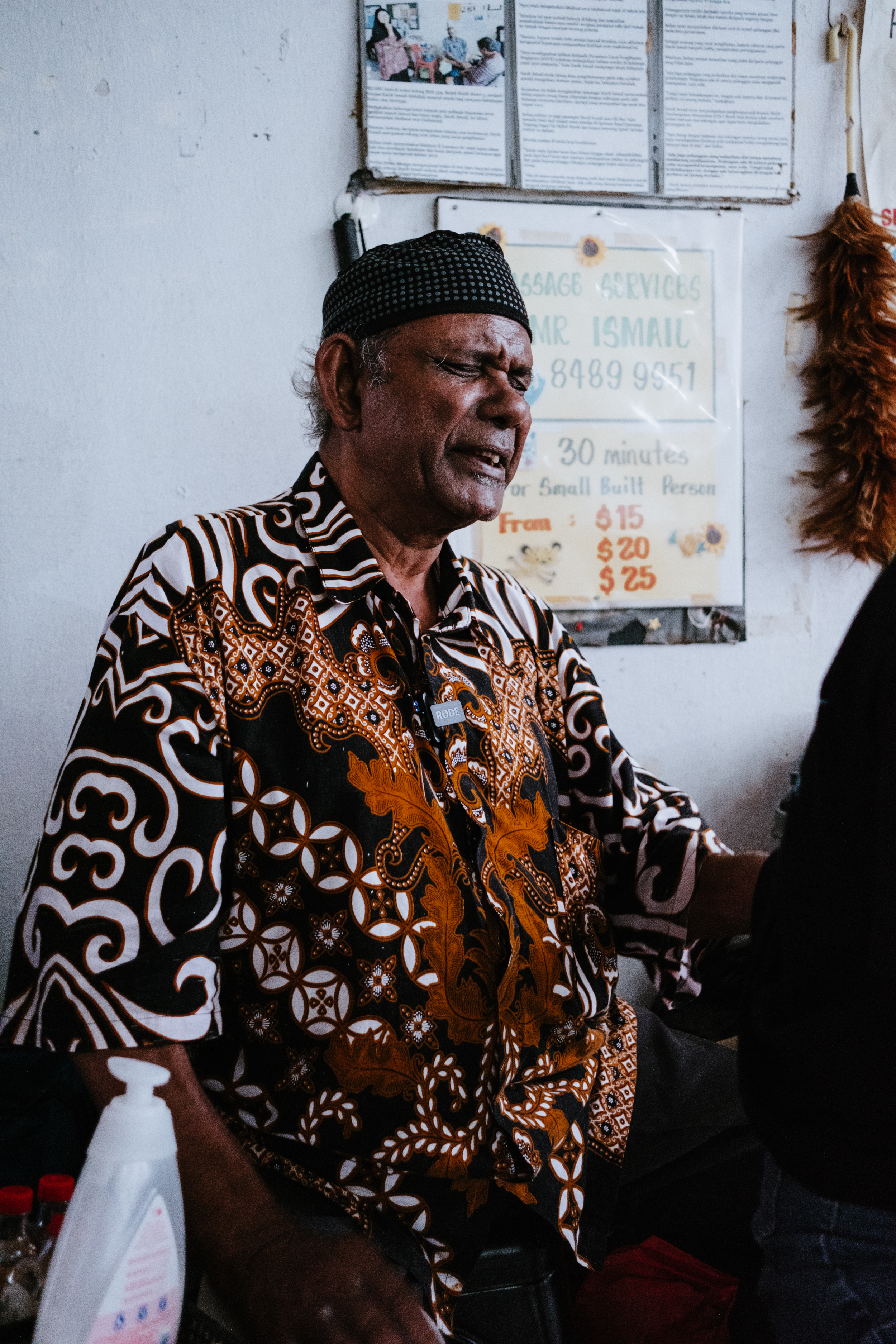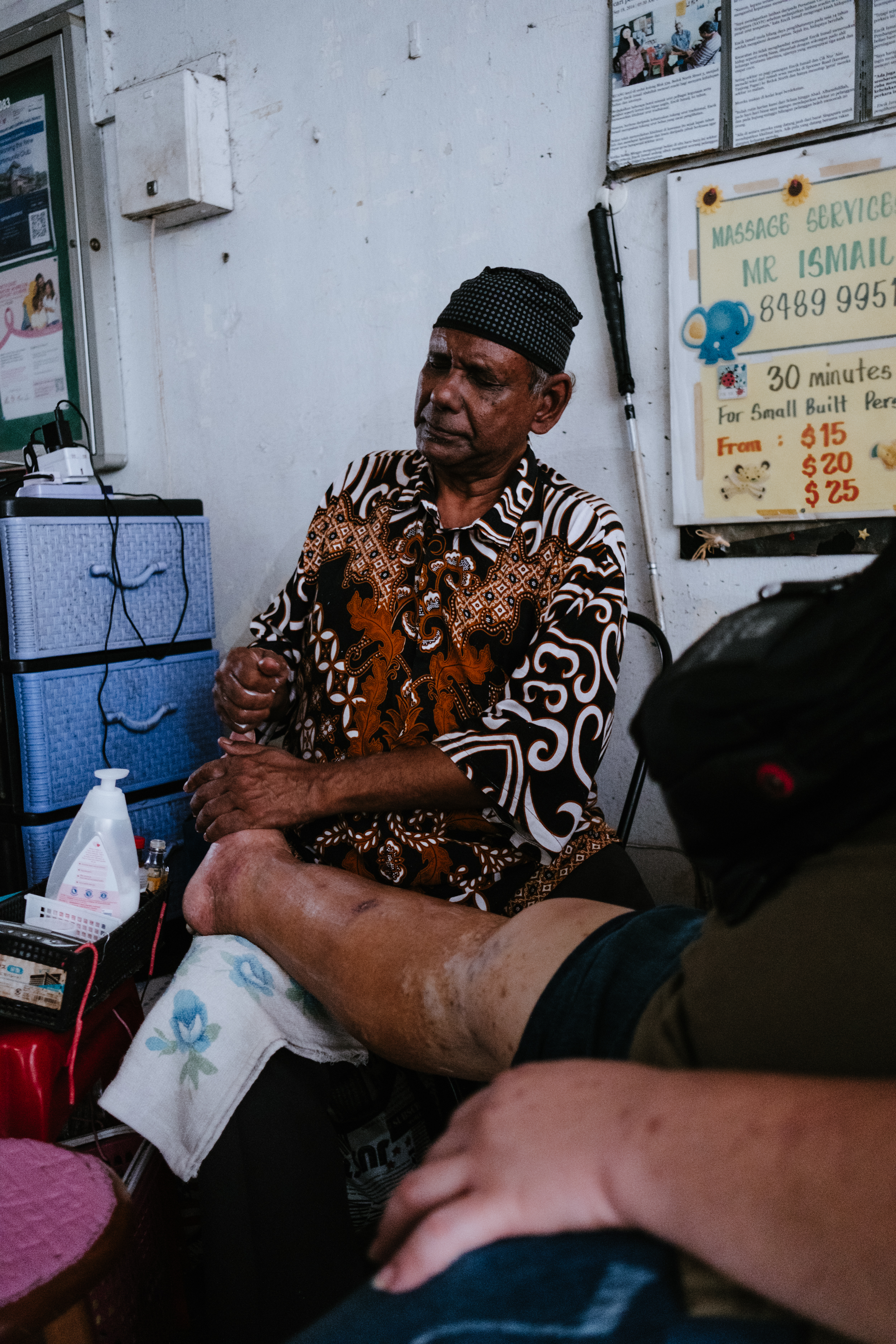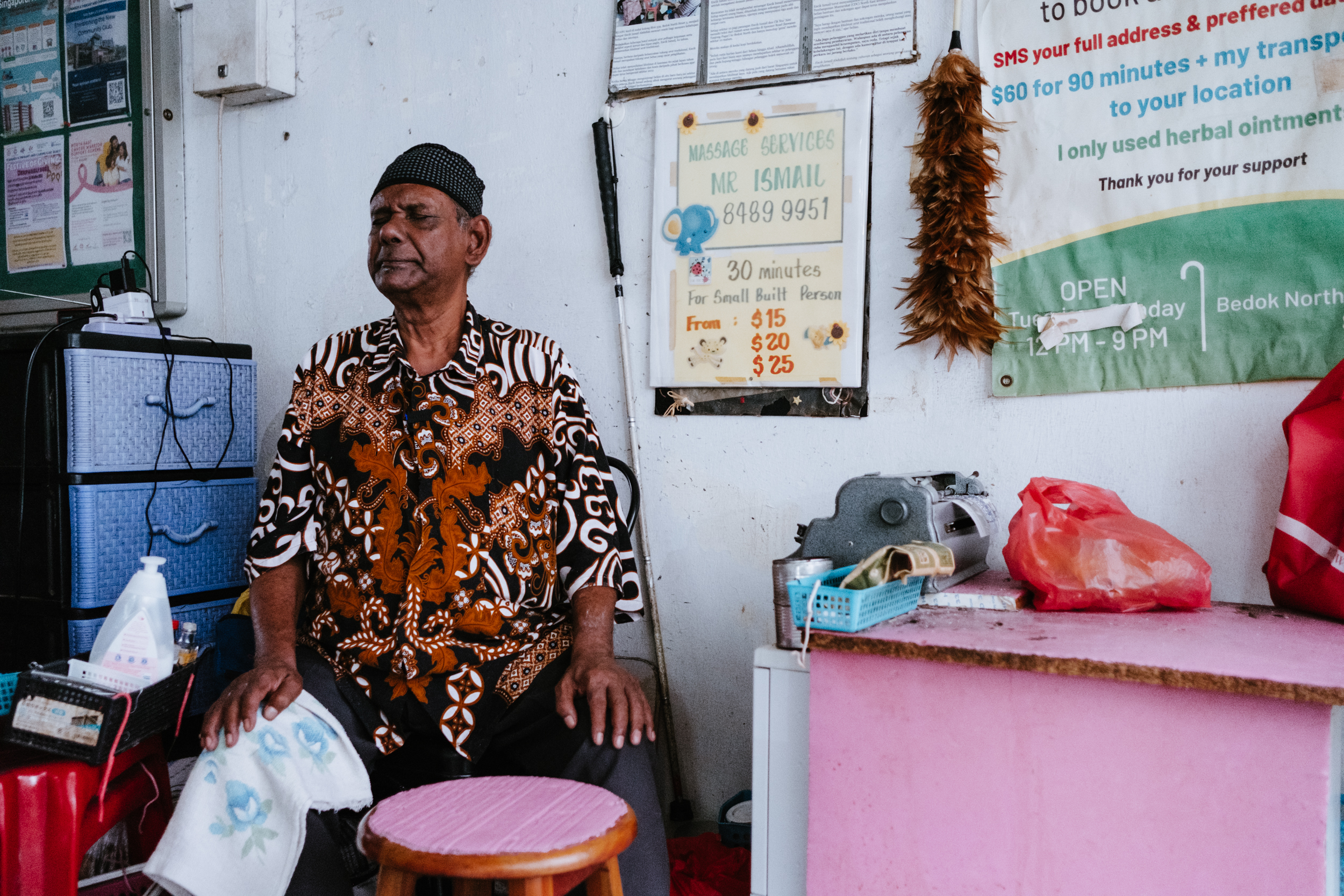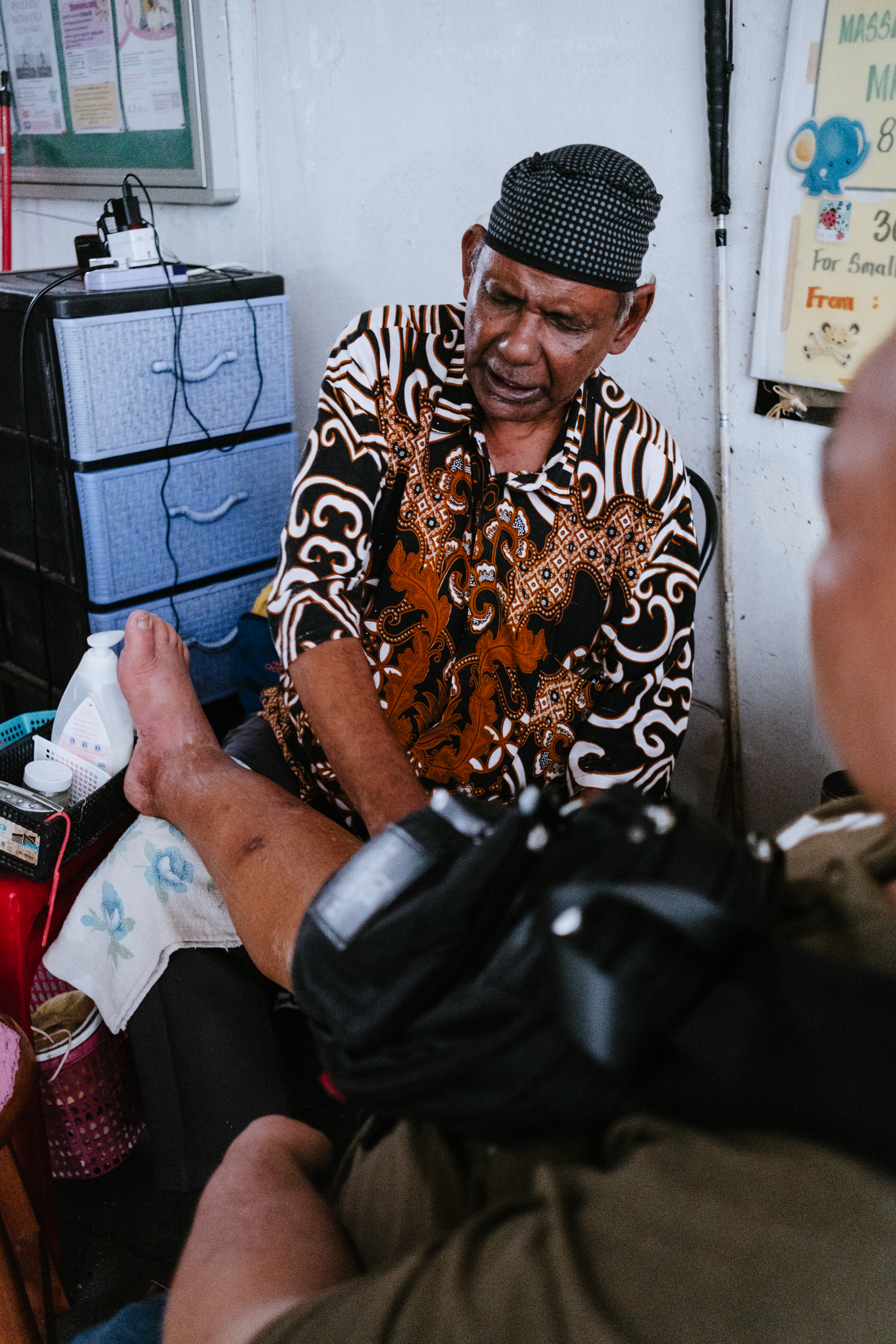I find Mr Ismail's massage booth in a nondescript corridor near Bedok 538 Food Centre.
The set-up has the haphazard appearance of something improvised and temporary. It's not; the massage booth has been there since 2006.
Ushering me onto one of the small stools in front of him, the masseur is all business. "You need to mic me up?" he asks, with the air of a seasoned interviewee.
Above his little stall is an assortment of news clippings from Chinese, Malay, and English publications — proof that he knows what he's talking about.
 Photo by Andrew Koay
Photo by Andrew Koay
In fact, the very reason I'm here is because of a video uploaded about a month ago by former Sembawang MP Amrin Amin.
The story here seems obvious. A blind masseur, who works nine-hour days, seven days a week, in a makeshift booth tucked between a fruit stall and a doctor's clinic.
"Blind but not broken," as the former MP's video goes.
Reality, however, is a little bit more complex for Ismail than a one-minute video can depict.
Hands that heal
The sharp smell of herbal oil is immediately evident when I enter the booth.
"This one, I make myself," Ismail — or Mr Ismail to his customers — explains when I ask. It's a mixture of lotion and Chang Mao Yew medicinal oil: his own recipe.
The 69-year-old began his massage business in 2000. He was not born blind; he lost his sight at age 14 after a high fever that, according to his doctors, nearly killed him.
"Then after that, I continued studying. To get this machine." He pats the grey typewriter beside him, a brailler that allows him to write by punching tiny holes in paper. It's been with him since he was 14.
After graduating, he took on a slew of different office and factory jobs. When he lost his job after the factory he was working at relocated to Malaysia, he decided to take up a massage course — a job with which he wouldn't require a guide, and that he could do independently.
"I thought, why not I learn something I can do my own self?"
Over the next few months, he studied massage therapy under two instructors: first Chinese-style massage, then Malay-style. These he combined into a technique of his own.
"Like this, I'm doing my own. No people can complain. I'm alone, I'm happy [with the] job," he explains.
 Photo by Andrew Koay
Photo by Andrew Koay
After a few years of travelling around, he settled down in his little corner of the corridor at Bedok North, where he has remained even 17 years later.
In that time, he's treated snake bites, stroke patients — and even helped detect cancerous lumps in one case. Some of his customers call him "Dr Ismail". I laugh when he tells me that.
"You don't laugh ah," he admonishes. "I'm not a doctor. Doctors have equipment [to diagnose people].
"But I use finger, I can know."
Just keep swimming
It isn't long before a customer appears at the booth — and then another. Both settle into nearby stools and wait patiently, as though they're used to it.
Ismail declines to share how many customers he sees, but reveals that he earns about S$100 to S$200 a day. "Sometimes more than that. It depends," he adds.
He has a comfortable amount of savings. Enough, probably, to support himself if he chose to retire today. His wife has passed away; his three daughters are grown.
But he doesn't.
"I still work, I still need to work. I happy to work. I don't like to stay at home," he says.
"And I love massage. To cure people's sickness, like aching here, aching there. Pain here, pain there."
Ismail generously offers a demonstration of his skills, in the form of a shoulder massage. Never one to turn down a freebie, I, of course, acquiesce.
As he works the knots out of my shoulders, I note how skilfully he navigates them, and how he reaches for his tools — a towel and a bottle of massage oil — with unseeing confidence.
That, combined with his casual mention of his blindness, makes me think that he really is what he seems like in all the newspaper articles: someone who rises above the odds. Blind but not broken.
Independent, like what he'd wanted when he'd set out to do massage in the first place.
 Photo by Andrew Koay
Photo by Andrew Koay
But it turns out that Ismail is candid about his weaknesses as he is about his strengths.
I probe a little more, and the story starts to diverge from that narrative. His first wife was more than a romantic partner — she was a business partner, too.
And he remarried after his first wife passed away five years ago.
"But she took my money, S$50,000, then she run away, never come back. She want to make a house, a hotel in Indonesia. She never stay with me, two months only."
"So I keep on saving, saving now again."
I ask if he's angry. He shrugs, either resigned or dismissive: I'm not sure which.
"I don't angry. Never mind lah, what to do?...I carry on lah. I got nothing to do, I cannot sit around."
Planning for the future
Turns out, independence sounds like a great thing. Until it isn't.
We talk about the future. Even at 69, even while blind, he's cognisant of the years that could lie ahead.
But he can't do it by himself.
"Maybe I open shop. If I got one more partner to work with me, a lady, I open shop lah," he tells me.
"I want to get somebody...to settle down with me. Although I'm 69."
Even after having his first wife pass away, and his second abscond with his life savings, he still wants to find a partner.
As he tells me about his past failed romances, I get the sense that for all his bravado and talk of independence, deep down, he's really just a lonely guy who wants someone to be with.
And how could he not be? As he openly shares, his customers are his company. His social life begins and ends with the massage shop. These are the only people he meets.
All the same — "I don't know to find a partner," he admits, in a moment of pure candour.
"But I really need to have someone. Really really.
I'm tired when I go back. I don't always say tired tired tired, but you need to have somebody at night to partner you. So when you feel tired at home, you're happy. Not alone. If not I'm alone, every time alone."
 Photo by Andrew Koay
Photo by Andrew Koay
Searching for years
For the past two years, Ismail says, he has been searching for a wife.
His hopes are practical. He wants somebody who can keep him company and who can care for him.
"I prefer Singaporean," he says, when I ask what attributes he's looking for. But really, the person's race doesn't matter, and neither does their age.
Most importantly, they need to join him in his business. That, he says, is non-negotiable.
In that sense, for Ismail, work and life is irreversibly intertwined. He loves his work, which gives him some independence and the ability to provide.
But he needs someone who can love and care for him in return. And if that means he has to keep working, to provide for that other person, he doesn't mind.
"I tell you honestly. When you like the job, you love the job, don't say tired lah. When you're happy, the whole day you work also okay," he says.
"[But I want to] get married, settle down lah. For my future lah. Because I know that I'm going to stay on, if I'm healthy, up to like 90 [years old]."
The years ahead are long. But Ismail is determined that they won't be lonely.
Being able to push forward in a world while blind takes strength.
But it's that — his willingness to admit to something so tough, yet so innately human — is some real strength.
Blind but not broken, indeed.
Top image by Andrew Koay

If you like what you read, follow us on Facebook, Instagram, Twitter and Telegram to get the latest updates.



